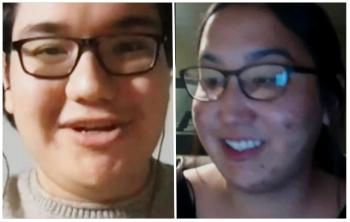Image Caption
Summary
Windspeaker.com Writer
Ontario youth leaders aren’t letting the grass grow under their feet during social-distancing and self-isolation measures due to the COVID-19 pandemic. They are keeping themselves busy working on innovative ways to stay connected and making self-care and mental wellness priorities in their lives.
During an update from the AFN National First Nations Youth Council during the Chiefs of Ontario COVID-19 Virtual Town Hall held May 6, moderator Marion Crowe asked Ontario representatives Darryl Hill and Juliana Lesage-Corbiere, both of the Ontario First Nations Young Peoples Council, how they were coping during a time when young people can’t gather.
Hill, from Six Nations, said Indigenous youth are using Zoom-call and video messaging technologies to stay connected, and he is also taking advantage of free online courses.
Six Nations has “barricaded” the territory to protect its members from the virus, he explained, so he’s been in self-improvement mode during the lockdown.
He said websites such as uedmy.com and coursera.org provide some free courses (search free courses when you get to the sites) and some will even send out a certificate when the course has been completed.
Lesage-Corbiere said connecting to the land had to be looked at through an innovative lens, sharing messages to youth about the importance of the land. The focus has been on mental wellness and how the land is connected to the way Indigenous peoples see health in a holistic way—emotionally, physically and spiritually.
Understanding languages is also a youth pastime, she said, with a lot of language and medicinal workshops online, which include different ways of how gardening and traditional medicines are directly connected to who we are as Indigenous people.
“Looking in our own backyard is to see, often, what Mother Earth has to offer. She has everything to sustain us as Indigenous people.”
Lesage-Corbiere said we can take this time during the pandemic to understand our connection to our roots, switching the conversation of mental wellness to “hope, belonging and resilience” and sharing those messages of ancestral wisdom.
The biggest part of what the youth council does is ensure there is a collective voice, said Lesage-Corbiere.
“We don’t only stand for ourselves. We stand for all of our relations. So another way to connect to land while we are here social distancing and self-isolating is to connect to our spirit, connect to that sacred fire burning within,” she said.
She said youth having been feeling silenced, not only during the pandemic, but before as well. She said a lot of the youth council’s work is to ensure that the youth voice is heard.
“Accessibility is one of the main barriers that we face as Indigenous youth,” she told town hall participants.
And there are connectivity challenges too for many remote and isolated communities during the pandemic. There are reports of some people having to sit in their vehicles in restaurant parking lots to access public WIFI for online school sessions. With band offices and administration buildings closed on reserve, some people don’t have access to internet services.
Youth have brought forward the issue of inadequate infrastructure of broadband connectivity on numerous occasions, said Crowe.
“This is a very important question,” said Julien Castonguay, director, regional plans and partnerships with Indigenous Services Canada, though he said he was unaware of any fund related to increasing broadband during the pandemic, despite it being a high priority.
It will be a critical aspect of how governments will provide services into the future, he said.
“It was a problem before COVID. Let me acknowledge that.” But the pandemic has shone a brighter light on the need, he said.

